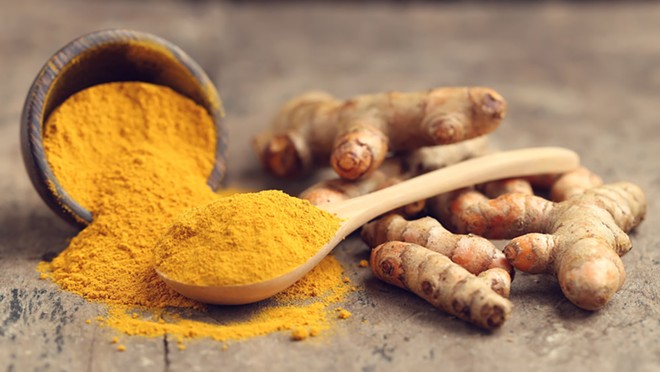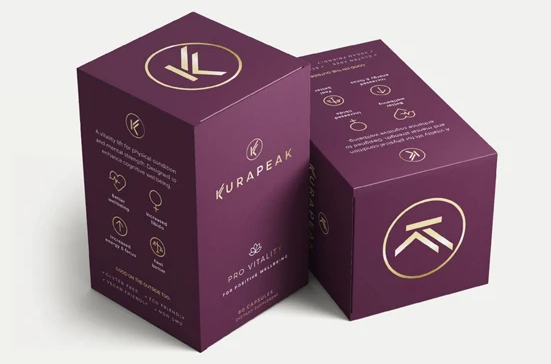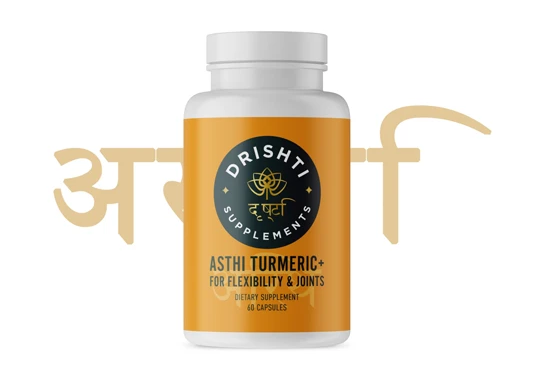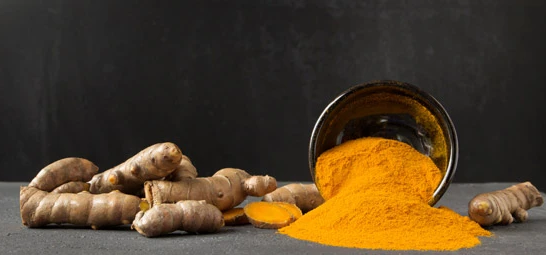Curcumin is a golden compound, famous for its beautiful color, tasty flavor, and numerous health benefits. Its use dates back nearly 4000 years, and still to this day, curcumin is used in holy ceremonies, curries, teas, and herbal medicines.
It has been used in Asian medicine for thousands of years, but now health experts and scientists from all over the globe are beginning to understand its power.
Curcumin is a compound found in the spice turmeric, a humble spice that sits in many people's cupboards; just one splash can bring bright yellow color and rich flavor to food.
Turmeric is an ancient spice and Ayurvedic medicine. It has been shown to aid digestion, boost your immunity, and treat arthritis pain. Some doctors have even seen success using it to treat cancer patients. The incredible benefits of turmeric root are because of the presence of curcumin.
If you solely sprinkle turmeric root into your curries, you will not be consuming enough to experience the wonderful benefits of curcumin. To benefit from this ancient medicine, you need to include a high-quality turmeric curcumin supplement into your daily routine.
TL; DR; - Quick Summary
In this article, we will dive into the science behind how a curcumin supplement can benefit your health. We will also review the best products on the market and explain why we have chosen them, based on things like dosage and bioavailability. However, in case you don't have much time, here is a short summary.
Turmeric root has been used for thousands of years, and for good reason; it has incredible anti-inflammatory and antioxidant capabilities, which make it beneficial to a range of ailments and diseases. These benefits are because of a compound in turmeric: curcumin.
Inflammation and oxidative stress are the triggers for diseases such as Alzheimer's, cancer, arthritis, and heart disease. For a long time, western medicine has focused on treatment rather than prevention. But now, doctors and scientists are increasingly advocating for the prevention of disease and the importance of taking action to keep yourself well.
The best curcumin supplement will help you to do just that.
However, it is important to know that the bioavailability of curcumin in turmeric is low. Therefore, you cannot get a sufficient amount from the spice alone or even from many of the turmeric extract supplements available. Luckily, we can easily aid the digestion of curcumin with a form of piperine, such as Bioperine.
Based on our research, our number one product is Kurapeak, which contains an optimal dose of curcumin and Bioperine for absorption. It also contains a range of other natural ingredients to help boost your mood and mental focus, as well as benefiting your long-term health.
Keep reading to find out more about the benefits of curcuminoids and why we chose Kurapeak as our favorite product.
What is the Most Absorbable Form of Curcumin?
If the absorption of curcumin from a turmeric supplement is low, you will be missing out on its many benefits.
Turmeric supplements come in a variety of forms, some of which are easier to absorb than others. One way to improve the absorption is to combine it with piperine, which is found in black pepper. Studies have shown that piperine enhances curcumin absorption by up to 2,000% (2).
Scientists are still debating about how this synergy works. Some scientists believe that the black pepper extract helps the curcumin pass through the intestinal wall and into your blood. (3) A second theory argues that black pepper slows down the breakdown of curcumin by the liver. (4)
If you are looking for the best turmeric supplements, look for one which includes black pepper extract or Bioperine. Black pepper extract also has advantages of its own, which pair well with curcumin. They are both powerful anti-inflammatories, have protective effects against cancers, and aid digestion. If you would like to read more about the combination of curcumin and black pepper extract, click here.
Is it Better to Take Turmeric or Curcumin?
Curcumin is a compound found in turmeric. Turmeric contains many compounds; however, most health benefits are thanks to a family of curcuminoid compounds. (5)
The most notable curcuminoids are curcumin, bisdemethoxycurcumin, and demethoxycurcumin. These three compounds together are often referred to as curcumin complex. However, curcumin is the most active and most beneficial to health, being an effective anti-inflammatory and antioxidant. (6) It's no wonder that it's responsible for the bright yellow color of turmeric powder.
However, the amount of curcumin in turmeric powder is low, around 3% (7). Most studies showing the benefits of turmeric supplements are made up of mostly curcumin. It isn't easy to consume enough curcumin by only using pure turmeric.
Therefore, the best turmeric supplements are made from turmeric extract that is mostly curcumin, with black pepper to increase the absorption. Turmeric supplements are also fat-soluble, so it is beneficial to take them with a meal.
The Best Curcumin Supplements
#1 Kurapeak
Kurapeak Pro Vitality Support contains curcumin 50:1 extract, comprised of 95% curcuminoids, at a dosage of 200 mg per capsule.
Kurapeak is a women's health supplement that has been formulated to reduce anxiety, enhance libido, boost energy, and promote cognitive performance. Curcumin is a key ingredient because of its ability to boost brain function, but you will still experience the range of other benefits we discussed as well. It also contains Bioperine, a type of black pepper, to aid absorption.
We like this product because of the precise dosage of 95% curcuminoids and added Bioperine. It also contains many other natural, high-quality ingredients to help you feel your best, including saffron and maca. The combination of ingredients will give you both noticeable daily benefits, as well as benefits to your long term health and well-being. The suggested dose is one capsule, twice a day, with meals.
All of the ingredients are vegan-friendly, non-GMO and allergen, soy, and gluten-free.
At $49 for 60 capsules, that works out to around $0.81 per capsule. Considering the high-quality ingredients and the presence of saffron, this is great value for money.
Best Curcumin Supplement - Kurapeak
#2 Drishti
Drishti Asthi Turmeric supplements for flexibility and joints contain 500 mg of turmeric per capsule, comprised of 95% curcuminoids.
Containing extra-strength turmeric, this formula has been designed to aid joints and increase flexibility. It is great for yoga lovers, athletes, and anyone who is committed to their health. It also contains black pepper for absorption and ginger extract to further soothe the joints and increase airflow to allow for a deeper breath.
All of the ingredients are natural, and the product is manufactured in cGMP facilities.
A 30 day supply costs $28.00, which is a great price for the well-researched ingredients in this product. Although this supplement is cheaper than Kurapeak, it contains fewer ingredients.
#3 Leanbean
Leanbean is a natural fat burner that contains 50mg of turmeric root alongside 5mg of Bioperine. Two capsules are the recommended dosage.
Although this formula has a low dosage of turmeric compared to the other products we have reviewed, it also contains some fantastic fat-burning ingredients and vitamins to give you more energy and focus. You can read more about the fat burning qualities of turmeric here.
Why Is Curcumin a Good Supplement?
The following benefits are evidence-based using studies of turmeric supplements with high amounts of curcumin.
Curcumin Is a Mighty Anti-Oxidant
Oxidative damage involves free radicals, which are highly reactive and unstable molecules. They usually interact with important organic substances such as DNA, fatty acids, and proteins. This Oxidative stress is one of the mechanisms responsible for aging, as well as many diseases.
Antioxidants are beneficial because they protect your body from free radicals and the damage they inflict. Curcumin is an effective antioxidant that neutralizes free radicals due to its chemical structure (8). Curcumin also boosts your body's natural antioxidant defenses. (9).
Turmeric supplements with high levels of curcumin can protect your body from the damage of free-radicals and boost your body's natural defenses. This dual effect makes this compound one of the most powerful antioxidants we know of.
Curcumin Has Anti-Inflammatory Properties
Inflammation is essential. It helps your body fight pathogens like bacteria, which could otherwise take over your body. Inflammation is also an important mechanism in repairing damaged tissues.
Although inflammation can be incredibly important, it becomes a serious problem when it turns chronic and begins to attack your own body's tissues.
In fact, inflammation plays a major role in almost every chronic disease, including cancer, heart disease, Alzheimer's, and metabolic syndrome. (10).
Anything that reduces chronic inflammation can have massive benefits for health and can prevent or even treat these diseases.
Turmeric curcumin is such a strong anti-inflammatory that turmeric supplements match the effectiveness of many anti-inflammatory drugs, but without the side effects! It works by blocking NF-kB, a molecule that moves into your cells' nuclei, turning on genes related to inflammation.
Curcumin Boosts Brain Function
The neurons in your brain have the capability to form new connections continually. Amazingly, in some areas of the brain, they can even multiply and increase in number. The reason your brain can do this is because of the brain-derived neurotrophic factor (BDNF), a type of growth hormone. (11).
Several common brain disorders are linked to low levels of BDNF, including Alzheimerâs disease and depression. (12, 13). Remarkably, curcumin increases brain levels of this hormone (14).
By increasing levels of BDNF, curcumin could delay or even reverse many brain diseases and decreases in brain function related to age. (15). It may even make you smarter.
Curcumin Treats Depression and Anxiety
Because of these increases in brain function, curcumin can be beneficial for people with depression or anxiety. In one study, participants suffering from depression were given either turmeric curcumin, an anti-represented drug Prozac, or both Prozac and curcumin.
After 6 weeks, those who took curcumin had similar improvements to those who took Prozac. But the group that took both experienced the greatest benefits. (16).
In this study, curcumin was at least as effective as an anti-depressant. This is probably because of the boost of BDNF levels. However, there is also evidence that this compound can boost brain neurotransmitters, serotonin and dopamine (17).
Curcumin May Prevent Alzheimerâs Disease
Alzheimer's disease is the most prevalent neurodegenerative disease in the world. Despite how common it is, there is no good treatment available yet. Therefore, prevention is key.
Curcumin has been shown to cross the blood-brain barrier (18). Furthermore, both oxidative damage and inflammation are involved in Alzheimerâs disease, and curcumin has beneficial effects on both (19).
Additionally, one of the causes of Alzheimer's is a buildup of protein tangles called amyloid plaques, and curcumin can help clear these plaques (20).
Because prevention is so important for degenerative diseases such as Alzheimer's, including a turmeric supplement with high levels of curcumin into your diet now could massively benefit your long-term health.
Turmeric Curcumin Can Help Prevent and Treat Cancer
Cancer comes in many forms, but each is characterized by uncontrolled cell growth. Curcumin may be beneficial to some kinds of cancer.
In studies, Curcumin has been shown to affect cancer development, growth, and spread at the molecular level (21). It can kill cancerous cells, reduce blood vessels' growth within tumors, and help curb cancer spread. (22).
There is also evidence that curcumin can prevent cancer, especially digestive system cancers such as colorectal cancer. In one 30-day study, men with colon cancer were given turmeric supplements with 4 grams of curcumin per day, which reduced the number of lesions in the colon by 40%. (23)
Although a high dose of curcumin with an absorption enhancer such as piperine could help to prevent and treat cancer, more studies need to be undertaken. However, early results are promising. Perhaps one day, more cancer patients will be given turmeric supplements as a complementary therapy alongside their cancer treatment.
Curcumin Lowers Your Risk of Heart Disease
The number one cause of death in the world is heart disease. The causes are numerous and complicated. However, there is evidence to show that curcumin can reverse steps in the process of heart disease. (24).
Endothelial dysfunction, which involves the opening and closing of your blood vessels, is one of the driving forces of heart disease. It causes unregulated blood pressure and blood clotting. (25) One of the key benefits of curcumin is that it improves the functionality of the endothelium. One study showed curcumin to be as effective as exercise. (26).
It also reduces oxidation and inflammation, which also have a role to play in heart disease. In one study, 121 people undergoing coronary artery bypass surgery were given a placebo or a turmeric supplement with 4 grams of curcumin before and after the surgery. The group of people given curcumin had a decreased risk of experiencing a heart attack in the days following surgery by 65%. (27).
Turmeric Curcumin Supplements Help People With Arthritis
Arthritis is a common ailment that involves inflammation of the joints. Because curcumin is such a potent anti-inflammatory, it can help people with arthritis.
In one study in people with rheumatoid arthritis, turmeric supplements with high levels of curcumin were actually more effective than an anti-inflammatory drug (28). Many other studies have noted big improvements in various symptoms for people with arthritis. (29).
How to Choose a Curcumin Supplement
- How much curcumin does the product contain? When youâre buying supplements, they should contain 150-250 mg of curcuminoids per serving for you to experience the true benefits. (30)
- Does the product contain piperine? When choosing the best turmeric supplements, they should include some form of black pepper, such as Bioperine, to increase bioavailability.
- Are the ingredients gluten-free, organic, and non-GMO? It is common for supplements to contain harmful and unnecessary fillers. A quality product should be gluten-free and non-GMO. That way, you know that the ingredients are ethically and naturally sourced.
- Look out for 95 curcuminoids. If a product states 95curcuminoids, that means that the formula is 95% curcuminoids. 95% curcuminoids are optimal for receiving a sufficient daily dose of curcumin with allowances for ingredients that aid absorption.
- The price. The amount you can spend on supplements may impact your choice. However, watch out for supplements that seem too cheap, as the low price-tag may be a sign that the ingredients are of low quality.
- Ingredient transparency. Trustworthy supplement companies will clearly explain which ingredients are included in their formula. In addition to the main ingredients, the dosages should be clearly labeled.
Final Thoughts
According to thousands of years of reported benefits, and modern scientific study, adding curcuminoids to your daily routine will bring you both short-term and long term benefits.
Turmeric supplements will boost your brain function, keep your inflammation levels in check, and even reduce oxidative stress. All of which will help you to live a long, active, and happy life.
Based on our research, we have found a product that we believe will help you to do just that. Kurapeak Pro Vitality Support capsules will provide you with a range of ingredients to give you a mental and physical boost.
Feeling stressed puts a strain on your mental and physical health, which becomes a cycle of unwellness. Sometimes we all need some extra support. By investing in yourself and taking a high-quality supplement such as this, you should notice quick improvements, which will have a long-lasting impact on your health and quality of life.
References
- Jäger, R., Lowery, R.P., Calvanese, A.V. et al. Comparative absorption of curcumin formulations. Nutr J 13, 11 (2014). https://doi.org/10.1186/1475-2891-13-11
- Hewlings, S. J., & Kalman, D. S. (2017). Curcumin: A Review of Its Effects on Human Health. Foods (Basel, Switzerland), 6(10), 92. https://doi.org/10.3390/foods6100092
- Kesarwani, K., Gupta, R., & Mukerjee, A. (2013). Bioavailability enhancers of herbal origin: an overview. Asian Pacific journal of tropical biomedicine, 3(4), 253–266. https://doi.org/10.1016/S2221-1691(13)60060-X
- Singh, J., Dubey, R. K., & Atal, C. K. (1986). Piperine-mediated inhibition of glucuronidation activity in isolated epithelial cells of the guinea-pig small intestine: evidence that piperine lowers the endogeneous UDP-glucuronic acid content. The Journal of pharmacology and experimental therapeutics, 236(2), 488–493.
- Akuri, M. C., Barbalho, S. M., Val, R. M., & Guiguer, E. L. (2017). Reflections about Osteoarthritis and Curcuma longa. Pharmacognosy reviews, 11(21), 8–12. https://doi.org/10.4103/phrev.phrev_54_16
- Akuri, M. C., Barbalho, S. M., Val, R. M., & Guiguer, E. L. (2017). Reflections about Osteoarthritis and Curcuma longa. Pharmacognosy reviews, 11(21), 8–12. https://doi.org/10.4103/phrev.phrev_54_16
- Tayyem, R. F., Heath, D. D., Al-Delaimy, W. K., & Rock, C. L. (2006). Curcumin content of turmeric and curry powders. Nutrition and cancer, 55(2), 126–131. https://doi.org/10.1207/s15327914nc5502_2
- Menon, V. P., & Sudheer, A. R. (2007). Antioxidant and anti-inflammatory properties of curcumin. Advances in experimental medicine and biology, 595, 105–125. https://doi.org/10.1007/978-0-387-46401-5_3
- Funda Gülcü Bulmuş, Fatih Sakin, Gaffari Türk, Mustafa Sönmez & Kadir Servi (2013) Protective effects of curcumin on antioxidant status, body weight gain, and reproductive parameters in male rats exposed to subchronic 2,3,7,8-tetrachlorodibenzo-p-dioxin, Toxicological & Environmental Chemistry, 95:6, 1019-1029, DOI: 10.1080/02772248.2013.829061
- Hunter P. (2012). The inflammation theory of disease. The growing realization that chronic inflammation is crucial in many diseases opens new avenues for treatment. EMBO reports, 13(11), 968–970. https://doi.org/10.1038/embor.2012.142
- Binder, D. K., & Scharfman, H. E. (2004). Brain-derived neurotrophic factor. Growth factors (Chur, Switzerland), 22(3), 123–131. https://doi.org/10.1080/08977190410001723308
- Heidi S. Phillips, Jeanne M. Hains, Mark Armanini, Gary R. Laramee, Steven A. Johnson, John W. Winslow, BDNF mRNA is decreased in the hippocampus of individuals with Alzheimer's disease, Neuron, Volume 7, Issue 5, 1991, Pages 695-702, ISSN 0896-6273 https://doi.org/10.1016/0896-6273(91)90273-3.
- Eiji Shimizu, Kenji Hashimoto, Naoe Okamura, Kaori Koike, Naoya Komatsu, Chikara Kumakiri, Michiko Nakazato, Hiroyuki Watanabe, Naoyuki Shinoda, Sin-ichi Okada, Masaomi Iyo, Alterations of serum levels of brain-derived neurotrophic factor (BDNF) in depressed patients with or without antidepressants, Biological Psychiatry, Volume 54, Issue 1, 2003, Pages 70-75, ISSN 0006-3223, https://doi.org/10.1016/S0006-3223(03)00181-1.
- Ying Xu, Baoshan Ku, Lu Tie, Haiyan Yao, Wengao Jiang, Xing Ma, Xuejun Li, Curcumin reverses the effects of chronic stress on behavior, the HPA axis, BDNF expression and phosphorylation of CREB, Brain Research, Volume 1122, Issue 1, 2006, Pages 56-64, ISSN 0006-8993, https://doi.org/10.1016/j.brainres.2006.09.009.
- Dong, S., Zeng, Q., Mitchell, E. S., Xiu, J., Duan, Y., Li, C., Tiwari, J. K., Hu, Y., Cao, X., & Zhao, Z. (2012). Curcumin enhances neurogenesis and cognition in aged rats: implications for transcriptional interactions related to growth and synaptic plasticity. PloS one, 7(2), e31211. https://doi.org/10.1371/journal.pone.0031211
- Sanmukhani, J., Satodia, V., Trivedi, J., Patel, T., Tiwari, D., Panchal, B., Goel, A., & Tripathi, C. B. (2014). Efficacy and safety of curcumin in major depressive disorder: a randomized controlled trial. Phytotherapy research : PTR, 28(4), 579–585. https://doi.org/10.1002/ptr.5025
- Kulkarni, S.K., Bhutani, M.K. & Bishnoi, M. Antidepressant activity of curcumin: involvement of serotonin and dopamine system. Psychopharmacology 201, 435 (2008). https://doi.org/10.1007/s00213-008-1300-y
- Mishra, S., & Palanivelu, K. (2008). The effect of curcumin (turmeric) on Alzheimer's disease: An overview. Annals of Indian Academy of Neurology, 11(1), 13–19. https://doi.org/10.4103/0972-2327.40220
- Hamaguchi, T., Ono, K. and Yamada, M. (2010), REVIEW: Curcumin and Alzheimer's Disease. CNS Neuroscience & Therapeutics, 16: 285-297. https://doi.org/10.1111/j.1755-5949.2010.00147.x
- Zhang, L., Fiala, M., Cashman, J., Sayre, J., Espinosa, A., Mahanian, M., Zaghi, J., Badmaev, V., Graves, M. C., Bernard, G., & Rosenthal, M. (2006). Curcuminoids enhance amyloid-beta uptake by macrophages of Alzheimer's disease patients. Journal of Alzheimer's disease : JAD, 10(1), 1–7. https://doi.org/10.3233/jad-2006-10101
- Anand, P., Sundaram, C., Jhurani, S., Kunnumakkara, A. B., & Aggarwal, B. B. (2008). Curcumin and cancer: an "old-age" disease with an "age-old" solution. Cancer letters, 267(1), 133–164. https://doi.org/10.1016/j.canlet.2008.03.025
- Ravindran, J., Prasad, S., & Aggarwal, B. B. (2009). Curcumin and cancer cells: how many ways can curry kill tumor cells selectively?. The AAPS journal, 11(3), 495–510. https://doi.org/10.1208/s12248-009-9128-x
- Carroll, R. E., Benya, R. V., Turgeon, D. K., Vareed, S., Neuman, M., Rodriguez, L., Kakarala, M., Carpenter, P. M., McLaren, C., Meyskens, F. L., Jr, & Brenner, D. E. (2011). Phase IIa clinical trial of curcumin for the prevention of colorectal neoplasia. Cancer prevention research (Philadelphia, Pa.), 4(3), 354–364. https://doi.org/10.1158/1940-6207.CAPR-10-0098
- Wongcharoen, W., & Phrommintikul, A. (2009). The protective role of curcumin in cardiovascular diseases. International journal of cardiology, 133(2), 145–151. https://doi.org/10.1016/j.ijcard.2009.01.073
- Toborek, M., & Kaiser, S. (1999). Endothelial cell functions. Relationship to atherogenesis. Basic research in cardiology, 94(5), 295–314. https://doi.org/10.1007/s003950050156
- Akazawa, N., Choi, Y., Miyaki, A., Tanabe, Y., Sugawara, J., Ajisaka, R., & Maeda, S. (2012). Curcumin ingestion and exercise training improve vascular endothelial function in postmenopausal women. Nutrition research (New York, N.Y.), 32(10), 795–799. https://doi.org/10.1016/j.nutres.2012.09.002
- Wongcharoen, W., Jai-Aue, S., Phrommintikul, A., Nawarawong, W., Woragidpoonpol, S., Tepsuwan, T., Sukonthasarn, A., Apaijai, N., & Chattipakorn, N. (2012). Effects of curcuminoids on frequency of acute myocardial infarction after coronary artery bypass grafting. The American journal of cardiology, 110(1), 40–44. https://doi.org/10.1016/j.amjcard.2012.02.043
- Chandran, B., & Goel, A. (2012). A randomized, pilot study to assess the efficacy and safety of curcumin in patients with active rheumatoid arthritis. Phytotherapy research : PTR, 26(11), 1719–1725. https://doi.org/10.1002/ptr.4639
- Deodhar, S. D., Sethi, R., & Srimal, R. C. (1980). Preliminary study on antirheumatic activity of curcumin (diferuloyl methane). The Indian journal of medical research, 71, 632–634.
- Tayyem, R. F., Heath, D. D., Al-Delaimy, W. K., & Rock, C. L. (2006). Curcumin content of turmeric and curry powders. Nutrition and cancer, 55(2), 126–131. https://doi.org/10.1207/s15327914nc5502_2













